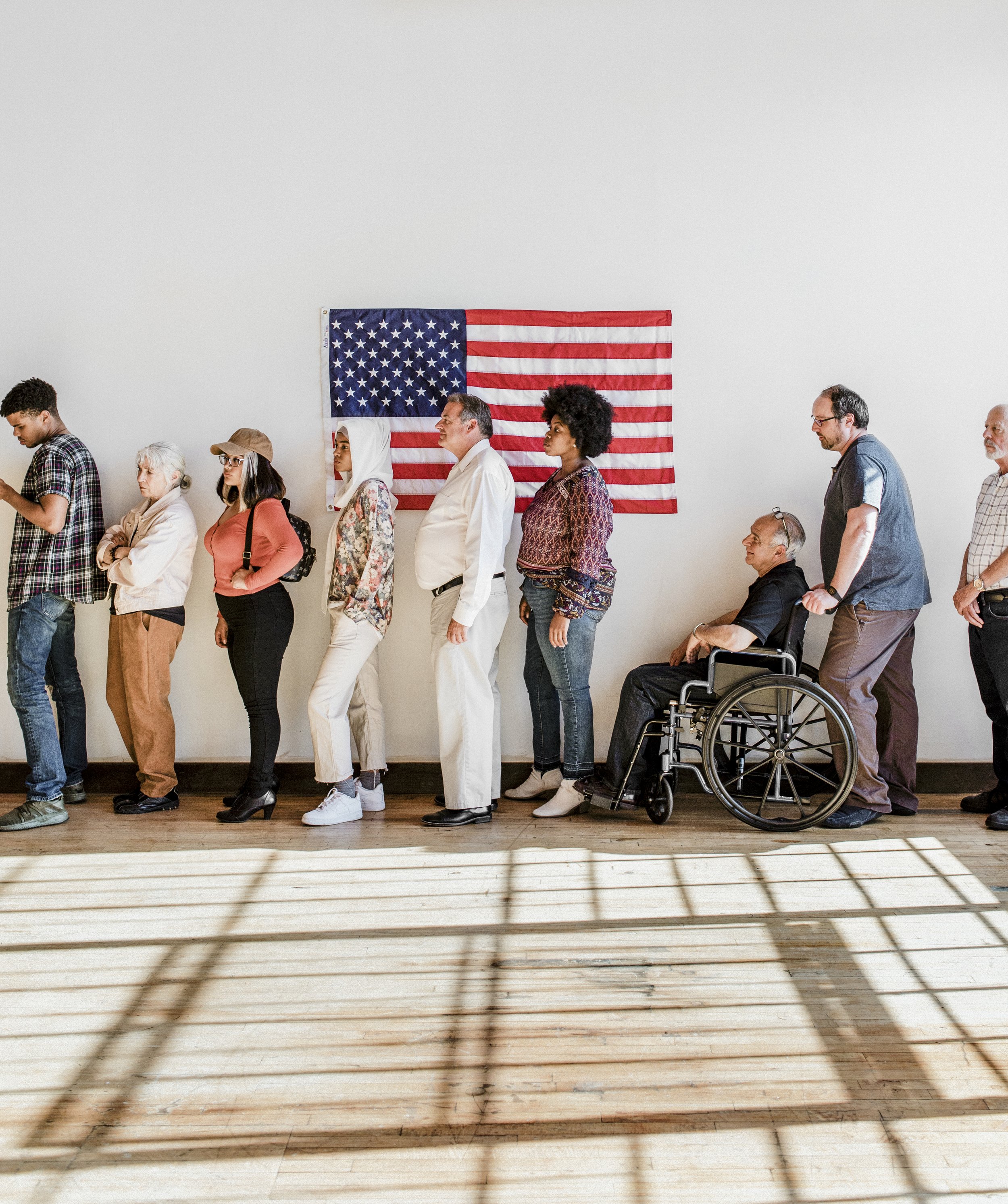Election Anxiety & Mental Health: Using IFS Therapy for Inner Peace
As the election season approaches, you might be more aware of feeling stress and anxiety. The polarized political climate, and the very real political outcomes on the line, can generate turmoil in the inner system. It is of course natural to feel concerned about the outcome of an important election. But excessive worry without a supportive framework or practice to act as an antidote can take its toll.
Within Internal Family Systems SM (IFS) is a basic assumption that the inner world reflects the outer world, and vice versa. People and their parts are impacted by global events. Even though IFS is known for its internal work, we recognize that the outer world affects and the inner world are profoundly interconnected.
When so many people around us are focused on something like an election in heated times, it can cause inner tumult. You may find the IFS model useful to understand better who inside is upset and how you can help. By tuning into what different parts of you feel, say, and need during this intense time, you can make more room for Self energy, fostering a sense of equilibrium and stability during a time of polarization, contentiousness, and uncertainty.
Parts Protecting You from Vulnerability
There are layers of protection and vulnerability that parts can take on, and can be amped up in times of higher stress. IFS recognizes that our protective parts can take on proactive (manager) or reactive (firefighter) roles, in the effort to keep us from feeling vulnerable. Parts in manager roles tend to like predictability, be focused on maintaining stability and control, and are risk-averse, and they can pursue these goals in any number of ways. As feelings of stress and vulnerability mount, other protectors in firefighter roles may react quickly to dampen, distract, or act out in an effort to reduce those feelings.
As November 5th approaches and political news amps up, it's highly likely parts of you might go into overdrive in any number of ways. See if you recognize any of the following parts inside yourself:
The Hypervigilant Information Seeker – Believes that staying constantly informed about every poll, news update, and development is crucial. This part may drive compulsive news-checking and social media scrolling.
The Strategic Planner – Tries to prepare for every possible outcome, often catastrophizing and creating elaborate contingency plans for worst-case scenarios.
The Perfectionist Activist – Pushes us to do more, convince more people, and have the perfect argument for every political discussion, often causing burnout and strained relationships as a result.
The Emotional Suppressor – Believes that showing any vulnerability or uncertainty about political issues is dangerous. It works hard to present a stoic, unshakeable exterior.
The Cynical Detacher – To protect us from disappointment or heartbreak, this part may push us to disengage entirely, insisting that "it's all rigged anyway" or "my vote doesn't matter."
The Conflict Avoider – Fears that political discussions will lead to irreparable relationship damage. It may steer us away from any potentially contentious conversations.
The Inner Critic – Berates us for not doing enough, not being informed enough, or not having the "right" political views. It believes that harsh self-judgment will motivate us to do better.
Tending to Election-Focused Parts
There’s no time like the present, but throughout this election season, consider ways you might tune into the parts of you that feel stressed inside your thoughts, feelings, and sensations. Make sure you have some time to yourself, and find a place with minimal distractions so you can focus. Maybe take a walk, or listen to some comforting music–whatever you know helps you feel supported. Take a few deep breaths, maybe close your eyes if that feels comfortable, and focus inside. If it ever starts to feel overwhelming, give yourself permission to stop for the time being, or consider reaching out to a trust friend or IFS therapist.
Start by simply bringing the election to mind. What do you say to yourself about it? What other reactions do you notice? Basically, what’s the conversation like inside?
How activated do you feel in your body when you think about the issues and people connected to politics. Are any of these feelings familiar to you? Physical sensations and emotions can be trailheads - or starting points - that can take you down the path of learning more about a part.
Notice what comes up, and if you choose to focus on a specific part, spend some time observing what it looks like, feels like, or sounds like. Stay curious and take note however it presents–if it has an image, or color, what would that be? If this part has a message, song, or a sound, how loudly or softly is it coming across? See if you can engage with a simple intention to better understand the parts that come up around the election, extending curiosity about their fears and motivations.
For example, you might notice a part that's pushing you to obsessively check poll numbers. When you tune into it, you might hear:
"I need to stay on top of every new piece of data. If we're not constantly vigilant, we could be blindsided by a terrible outcome. We can't afford to relax."
This hypervigilant part is trying to protect you from the pain of being unprepared or caught off guard. While its intentions are good, its methods may be causing more stress than necessary. Ask this part, what is it basing its concerns on? Has its reaction been necessary before? With attuned listening, let the conversation unfold until the part feels understood. When the timing feels right, ask this part what it needs from you.
Helpful Strategies for Election-Anxious Parts
You can start to work with any parts that come up around the election by asking this part what it needs from you, your Self energy. It might need some time to relax, boundaries around checking the news and polls, or even permission to worry and reassurance that hypervigilance is a normal response to the experience of uncertainty.
Parts may simply need you to check in more regularly in any of the following ways:
Acknowledge and appreciate: Thank any protective parts for trying to protect you. Recognize that even if their methods are causing distress, their intentions are positive. It may also be flagging something from the past that needs to be processed further.
Set gentle limits: Work with parts to find more balanced approaches. For example, you might limit news checking to specific times of day. Sometimes we can find other parts to help with setting limits.
Address underlying fears: Often, parts in manager roles are protecting vulnerable exiles. Ask your parts what they're afraid might happen if they relaxed their vigilance. Is there a basis for the fear? Has something like this happened before that may require more listening? Often the present is connected to the past.
Offer reassurance: Let your parts know from a Self-led place that you are capable of handling challenges and uncertainties. They don't need to carry the entire burden of keeping you or other parts of you safe.
Find compromise: Work with your parts to find ways of staying informed and engaged that don't lead to burnout or excessive anxiety. For example, if you are engaged in activism and political organizing, you might see how it would be to focus on one or two key issues rather than trying to be involved in everything.
Promote cooperation: Sometimes different parts may be in conflict (e.g., one pushing for more activism while another advocates for withdrawal). Facilitate dialogue between these parts to find a middle ground.
Encourage flexibility: Gently notice any rigid thinking from your parts, until you really find out what’s at stake for them. Then you can remind them that adaptability can be a strength in uncertain times, and that other parts are there to help. You’re not alone.
As always, working with a skilled IFS therapist will add even more Self energy into your interactions with your parts, giving you more clarity about what parts need and what might help them feel more resourced.
Fostering an Inner Democracy
As we work with our parts around election anxiety in IFS therapy for election stress and beyond, we are essentially working to cultivate a stronger and more supportive inner democracy. Just as in a healthy political system, we want all voices to be heard and valued while also maintaining overall stability and direction.
The IFS process can lead to greater self-awareness and more nuanced political engagement. As we begin to better understand the interplay of our internal system, we may find ourselves better able to empathize with others' perspectives, or at least understand what lies beneath and engage in constructive dialogue across differences. We don’t have to agree with others, but seeking to understand keeps us in community with each other.
Remember, the goal isn't to eliminate all election-related anxiety or to silence our concerns. Rather, we're aiming for a balanced system where our parts can fulfill their protective roles without causing undue stress or limiting our ability to engage thoughtfully in the political process.
By fostering harmony among our parts, we build resilience not just for election season, but for navigating life's ongoing challenges. As you gain more fluency with your inner world, you’ll be able to speak for what needs to be spoken for. Take action from a more resourced sense of Self.
With practice, you may find you can remain informed and active in the political process without abandoning your Self or parts, and contribute to creating the kind of world you want to live in–regardless of the election outcome.
A therapist at the IFS Telehealth Collective can help you find and connect with the parts that need to be seen, heard, and ultimately healed. If you live in California, Florida, New York, or Oregon, please contact our Client Care Coordinator or call 503-447-3244.
Join our Interest List if your state is not listed and we’ll notify you as soon as we begin seeing clients in your area. In the meantime, subscribe to our newsletter below and receive a free download. Don't forget to follow us on social media: Facebook, Instagram, and LinkedIn.





